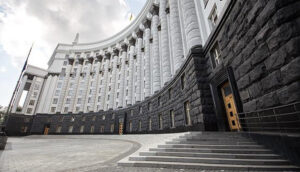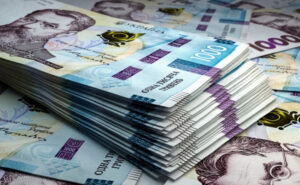
The Cabinet of Ministers of Ukraine has canceled quotas for exports of coking coal of “K” grade for 2026, according to the government’s resolution No. 1795 of December 31 on the list of goods, export and import of which are subject to licensing and quotas.
According to the resolution, the quotas for exports of coking coal grade “K”, which were previously set at zero level, are absent in the document for 2026.
The resolution was published on the government website.

The Chairman of the Verkhovna Rada, Ruslan Stefanchuk, considers the statements made by the Speaker of the Chamber of Deputies of the Czech Parliament, Tomio Okamura, against providing weapons to Ukraine to be an example of ignorance and cynicism.
“Tomio Okamura’s New Year’s address is a striking example of ignorance, manipulation, and cynicism. By once again insulting Ukraine and Ukrainians, he is actually harming and discrediting the Czech Republic and the Czech people, who remain on the side of dignity and justice, on the side of Ukraine,” Stefanchuk wrote on Facebook on Friday.
According to him, Ukraine is grateful to the great Czech people and their worthy representatives for all their help and support in difficult times.
In Stefanchuk’s opinion, the statements of the Czech speaker are exclusively his personal position, not the position of the Czech parliament and the Czech people.
“I am convinced that the harshest assessment of Okamura’s words will be given by the Czechs themselves — and, of course, by history, in which his name is unlikely to be preserved. And we will definitely find out whether he was a useful idiot or an FSB agent,” the speaker of the Ukrainian parliament emphasized.
According to Česke noviny (CTK), Speaker of the Chamber of Deputies Tomio Okamura (SDP) “once again spoke out on social media against providing weapons to Ukraine.”
“I believe that our republic will jump off the Brussels train, which, despite warnings from the US government, is heading towards World War III… I understand that it is profitable for the West when we pay Western arms companies for ineffective weapons that the Russians will neutralize before they even reach the front,“ CTK quotes the Speaker of the Chamber of Deputies as saying.
”Money is flowing in all directions, and everyone is getting something out of this business. Western companies and governments, as well as Ukrainian thieves around Zelensky’s junta, who are building toilets out of gold… Let them steal, but not from us, and let there be no such country in the European Union,” CTK quotes a fragment of Okamura’s speech.

President of Ukraine Volodymyr Zelensky offered the head of the Main Intelligence Directorate of the Ministry of Defense, Kirill Budanov, to head the Office of the President.
“I met with Kirill Budanov and offered him to head the Office of the President of Ukraine. Right now, Ukraine needs to focus more on security issues, developing Ukraine’s defense and security forces, and the diplomatic track in negotiations, and the Office of the President will serve to fulfill these tasks of our state first and foremost,” Zelensky wrote on Telegram on Friday.
According to the president, Budanov has special experience in these areas and sufficient power to achieve results.
In addition, Zelensky instructed the new head of the Office of the President, in cooperation with NSDC Secretary Rustem Umerov and other necessary leaders and institutions, to update and submit for approval the strategic principles of Ukraine’s defense and development and further steps.

The GT Tested Reader Survey Awards are Global Traveler ‘s annual awards based on the results of an open reader survey (frequent, usually affluent travelers). For 2025, the survey was conducted from December 12, 2024 to August 31, 2025, more than 80 categories are declared ; the results are published in the December issue.
Below are the key “airline” categories (top 3):
1) Best Overall Airline in the World: 1) Emirates, 2) Singapore Airlines, 3) United Airlines.
2) Best Airline Alliance: 1) oneworld, 2) Star Alliance, 3) SkyTeam.
3) Best Aircraft Type: 1) Boeing 787, 2) Boeing 777, 3) Airbus A350.
4) Best Airline Website: 1) delta.com, 2) united.com, 3) aa.com.
5) Best Airline for Business Class: 1) Turkish Airlines, 2) Singapore Airlines, 3) United Airlines.
6) Best Air line for International First Class: 1) Etihad Airways, 2) Air France, 3) Cathay Pacific.
7) Best Air line for Domestic First Class: 1) Delta, 2) United, 3) American Airlines.
8) Best Airline Lounges: 1) Delta Sky Club, 2) American Airlines Admirals Club, 3) United Club.
9) Best Airline for Onboard Service: 1) Asiana, 2) Korean Air, 3) Cathay Pacific.
10) Best Airline for Flight Attendants: 1) Asiana, 2) Korean Air, 3) Cathay Pacific.
11) Best Flight Attendant Uniforms: 1) Condor, 2) Emirates, 3) Singapore Airlines.
12) Best Airline Cuisine: 1) Turkish Airlines, 2) Air France, 3) Korean Air.
13) Best First-Class Seat Design: 1) Cathay Pacific, 2) Korean Air, 3) Emirates.
14) Best Business-Class Seat Design: 1) Swiss, 2) United, 3) Korean Air.
15) Best Airline Cabin Cleanliness: 1) Air Canada, 2) United, 3) Cathay Pacific.
16) Best Airline App: 1) Delta, 2) United, 3) Alaska Airlines.
Regional/route categories (top 3):
1) Best Airline in North America: 1) Delta, 2) Air Canada, 3) United.
2) Best Airline to South America & Central America: 1) avianca, 2) LATAM, 3) Copa.
3) Best Airline in Mexico: 1) Aeromexico, 2) Volaris, 3) VivaAerobus.
4) Best Airline in the South Pacific: 1) Air Tahiti Nui, 2) Fiji Airways, 3) Qantas.
5) Best Airline in Europe: 1) TAP Air Portugal, 2) Lufthansa, 3) Air France.
6) Best Airline in Eastern Europe: 1) Air Serbia, 2) LOT, 3) Wizz Air.
7) Best Airline in Africa: 1) Royal Air Maroc, 2) Ethiopian, 3) Kenya Airways.
8) Best Airline in Australia and New Zealand: 1) Qantas, 2) Fiji, 3) Air Tahiti Nui.
9) Best Airline in the Middle East: 1) Etihad, 2) Emirates, 3) Gulf Air.
10) Best Airline in North Asia (excluding China): 1) Cathay Pacific, 2) China Airlines, 3) STARLUX.
11) Best Airline in Central/South Asia & India: 1) Air India, 2) Indigo, 3) SpiceJet.
12) Best Airline in China: 1) Air China, 2) Xiamen, 3) China Southern.
13) Best Airline to Japan: 1) ANA, 2) JAL, 3) United.
14) Best Trans-Atlantic Airline: 1) British Airways, 2) TAP, 3) Air France.
15) Best Trans-Pacific Airline: 1) Cathay Pacific, 2) Singapore Airlines, 3) Japan Airlines.

Starting January 1, 2026, to retire at age 60, both men and women must have 33 years of service, and the minimum old-age pension has increased by 234 hryvnia.
According to the law “On Compulsory State Pension Insurance,” the minimum old-age pension for men with 35 years of insurance experience and women with 30 years of insurance experience is set at the subsistence minimum for persons who have lost their ability to work.
The law “On the State Budget for 2026” stipulates that on January 1, the subsistence minimum for persons who have lost their ability to work is UAH 2,595, accordingly, the minimum old-age pension has increased from UAH 2,361 to UAH 2,595.
According to the Pension Fund of Ukraine (PFU), from January 1, 2026, both men and women will need to have 33 years of service to retire at 60; citizens will be entitled to retire at 63 if they have at least 23 years of service; at 65 – 15 years of service.
If a person has less than 15 years of service, at the age of 65, they will be entitled to receive state social assistance instead of pension payments.

Actual revenues to the general fund of the state budget from taxes and fees controlled by the State Tax Service of Ukraine (STS) amounted to UAH 1 trillion 246 billion in January-December 2025, which is 20.2% or UAH 209.3 billion more than last year, according to a publication on the institution’s website.
According to the STS, despite an increase in planned indicators during the year by more than UAH 100 billion, the annual revenue plan was fulfilled by 97.4%.
According to the acting head of the State Tax Service, Lesya Karnaukh, quoted in the report, the stable over-fulfillment of targets during the first half of the year created the necessary financial reserve, which made it possible to avoid significant shortfalls at the end of the year.
It is noted that in the structure of the main sources of budget revenues for the 12 months of 2025, the largest share was provided by personal income tax and fees, which amounted to UAH 362.9 billion. Value added tax (including budget refunds) brought UAH 306.5 billion to the budget, and corporate income tax brought UAH 284.7 billion. In addition, excise tax revenues amounted to UAH 163.9 billion, while rent payments provided UAH 48.4 billion.
Karnaukh separately highlighted the dynamics of VAT budget refunds, which totaled UAH 179.6 billion for the year. At the same time, the monthly refund rate during the year was not less than UAH 13 billion.
“Today, businesses have to reorient significant financial resources and invest in recovery and relocation. I am grateful to everyone who does not give up,” said the acting head of the State Tax Service.
She also added that the achievement of these indicators in the context of war, shelling, and energy challenges is the result of the responsibility of each taxpayer.